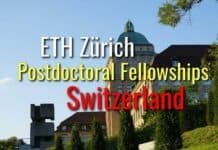Postdoctoral Researcher in Genome Architecture: The International Institute of Molecular Mechanisms and Machines Polish Academy of Sciences (IMol) is seeking a highly motivated Postdoctoral Researcher to join the Lab of Immunological Epigenetics/Mikulski Lab. The successful candidate will delve into the mechanisms of genome architecture and chromatin landscape remodeling in the context of cancer immune signalling. This full-time position, based in Warsaw, Poland, offers an opportunity to work in a vibrant and modern research environment with a strong international collaborative network.
Postdoctoral Researcher in Chromatin Epigenomics & Genome Architecture
Job Summary Table
| Organisation/Company | The International Institute of Molecular Mechanisms and Machines Polish Academy of Sciences |
|---|---|
| Research Field | Biological Sciences » Biology |
| Researcher Profile | Recognised Researcher (R2) |
| Country | Poland |
| City | Warsaw |
| Application Deadline | 30 Jun 2024 – 23:59 (Europe/Warsaw) |
| Type of Contract | Temporary |
| Job Status | Full-time |
| Hours Per Week | 40 |
| Offer Starting Date | 1 Jul 2024 |
| Funded by EU Program? | No |
| Reference Number | postdoc / lm NAWA PM call 08 2023 |
Designation
Postdoctoral Researcher
Research Area
Chromatin Epigenomics & Genome Architecture
Location
Warsaw, Poland
Eligibility/Qualification
- Essential:
- Motivation and drive to create impactful work
- Self-starter and team player
- PhD in Molecular Biology, Biochemistry, Genetics, or a related field (or close to obtaining)
- Experience in basic molecular biology techniques
- Experience in one or more methodologies: mammalian cell culture, next-generation sequencing (wet-lab), chromatin assays (e.g., ChIP, Cut&Run), RNAi, cell synchronization, CRISPR, FACS, qPCR, genome architecture (e.g., Capture-C, 3C, Hi-C)
- Excellent organizational and communication skills
- Proficiency in English (oral and written)
- Desirable:
- Experience in bioinformatics (Unix, R or Python), preferably epigenomics/NGS analyses
- Previous supervision of junior team members
Job Description
The successful candidate will investigate the role of genome architecture and chromatin landscape remodeling in transcriptional memory, activation, and de-repression of immune response genes in cancer cell lines. The focus will be on interferon-γ-stimulated genes using bioinformatic and wet-lab methodologies such as Cut&Run, Capture-C, NGS data analysis (Illumina/Nanopore), FACS, and CRISPR. Training in both wet-lab and bioinformatic methodologies will be provided.
Key Responsibilities:
- Decipher the role of genome architecture and chromatin landscape remodeling in cancer immune signalling
- Investigate mechanisms of cis-regulatory elements, histone marks, and chromatin modifiers
- Utilize and develop cutting-edge techniques in epigenomics, transcriptomics, and chromatin assays
Benefits
- Full employment contract for 32 months (6-month probation) with possible extension
- Gross-gross monthly salary of 10,000 PLN/month (approx. gross 8,800 PLN/month; net 6,750 PLN/month)
- Support for professional development including courses, conferences, and grant submission assistance
- Regular interaction with international guest speakers and participation in scientific clubs
- Access to a broad network of collaborators and potential for staff exchange
- Focus on research with no teaching obligations
- Friendly, international, and collaborative working atmosphere
- Institutional benefits such as reduced-rate medical care packages
- Comprehensive technical, administrative, and organizational support
How to Apply
Prospective candidates should apply by filling out the following form: Application Form. Please include:
- Cover letter (detailing motivation to join the group, future plans, expertise, and contributions)
- CV
- Two reference contacts (contact details only)
Last Date for Apply
30 June 2024
For more details, visit the Mikulski Lab website.
Apply now to join our dynamic team and contribute to groundbreaking research in cancer immunotherapy and epigenetics!







